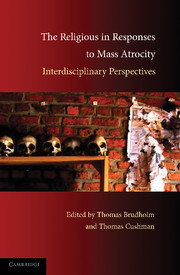Book contents
- Frontmatter
- Contents
- List of Contributors
- Acknowledgments
- Introduction: The Religious in Responses to Mass Atrocity
- Part I Between Necessity and Impossibility: The Role of Religion in the Face of Atrocity
- 1 Religious Rhetoric in Responses to Atrocity
- 2 The Limit of Ethics – The Ethics of the Limit
- 3 The Intolerability of Meaning: Myth, Faith, and Reason in Philosophical Responses to Moral Atrocity
- Part II Does It Help to Import Religious Ideas: Reflections on Punishment, War, and Forgiveness
- Part III Sociologies of the Religious in Responses to Mass Atrocities
- Index
2 - The Limit of Ethics – The Ethics of the Limit
Published online by Cambridge University Press: 01 September 2009
- Frontmatter
- Contents
- List of Contributors
- Acknowledgments
- Introduction: The Religious in Responses to Mass Atrocity
- Part I Between Necessity and Impossibility: The Role of Religion in the Face of Atrocity
- 1 Religious Rhetoric in Responses to Atrocity
- 2 The Limit of Ethics – The Ethics of the Limit
- 3 The Intolerability of Meaning: Myth, Faith, and Reason in Philosophical Responses to Moral Atrocity
- Part II Does It Help to Import Religious Ideas: Reflections on Punishment, War, and Forgiveness
- Part III Sociologies of the Religious in Responses to Mass Atrocities
- Index
Summary
In pondering this question, it did not escape me that resentment is not only an unnatural but also a logically inconsistent condition. It nails every one of us onto the cross of his ruined past. Absurdly, it demands that the irreversible be turned around, that the event be undone. Resentment blocks the exit to the genuine human dimension, the future.
– Jean Améry, “Resentments,” At the Mind's Limits, p. 68.Ethics?
The title “The Limit of Ethics – The Ethics of the Limit” may give rise to two questions, at least. First, why should we talk about ethics when we are dealing with the religious in responses to mass atrocities? This first question reverses a question that could be posed to the title of this book: Why focus on religion in responses to mass atrocities? Mass atrocities are morally horrifying. In dealing with responses to mass atrocities we are in the sphere of morality or ethics. Why should responses to mass atrocities go beyond ethics in invoking the religious? One could, of course, argue that religious responses to mass atrocities are in fact deeply moral. But I take it that what we are asking about is the religious in a sense in which it cannot just be translated into a moral response.
Second, if we are in the sphere of ethics, why should we then talk about the limit of ethics? As the first question opens up the issue between ethics and religion, the second leads into my argument: We have to ask about the limit of ethics, both to understand why the religious can enter the picture, in response to what is morally horrifying, and to understand what is ethically at stake, also in religious responses. Th e limit of ethics implies an ethics of the limit.
- Type
- Chapter
- Information
- The Religious in Responses to Mass AtrocityInterdisciplinary Perspectives, pp. 38 - 59Publisher: Cambridge University PressPrint publication year: 2009
- 9
- Cited by

